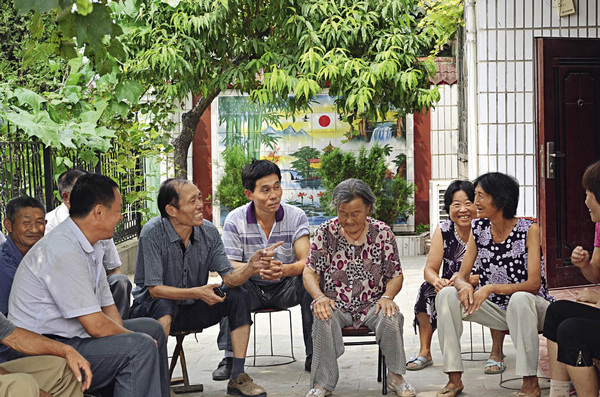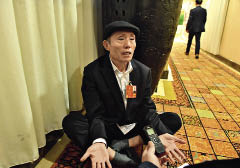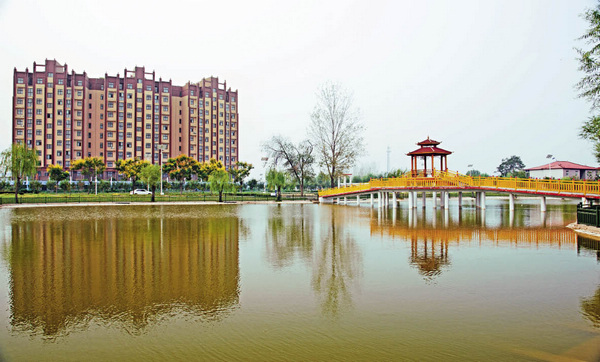
Li Liancheng (third from left) discusses local development with other villagers.

Li Liancheng (third from left) discusses local development with other villagers.
LI Liancheng, aged 67, the Party secretary of Xixinzhuang Village, Henan Province, has been in this position for 27 years. He speaks in Henan dialect and displays the shy smile of a Chinese farmer. He has his own simple definition of rural revitalization: “In my opinion, it’s when villagers have access to the same resources as city dwellers. For example, city dwellers live in modern buildings, have access to good schools, large hospitals, and many employment opportunities. If villagers had access to the same resources, rural revitalization would be achieved.”
From Poverty to Moderate Prosperity
Xixinzhuang Village, located 22.5 kilometers south of Puyang County in Henan, used to be a small remote village known for its salt production.
In 1991, at the age of 40, Li was elected as the Party secretary due to his good performance at work and his understanding of doing business. “In 1983, with the exploitation of the Zhongyuan Oilfield, I understood the country wanted to stimulate domestic economic development,” said Li. He then built three greenhouses to grow vegetables, and employed an agrotechnician whose annual remuneration was RMB 10,000. At that time, it was a large sum of money; in a village or even in a town, it is rare for a single family to have an annual income of RMB 10,000.

Li Liancheng, sitting on the ground, gives an interview to China Today.
In 1991, the village had 172 households and about 700 inhabitants and the average annual income per person was RMB 600. Before making a fortune, Li had to overcome many difficulties, like not being able to afford food and not having access to education or employment. When elected in 1991, he decided to commit to eliminating poverty in his village.
As the leader of the village, the first step he took was to develop vegetable production in greenhouses. “We did not have a lot of money or experience, but greenhouses could bring us sizable profit, so the villagers trusted me.” Under his leadership, the village built 40 greenhouses in one year, increasing the annual per capita income by RMB 600.
However, in 1994, greenhouse vegetable cultivation generated less profit due to its increase in popularity. After a discussion with others, Li decided to initiate an “economic transformation.”
He chose to set up a recycled paper business, but that too brought its own unique challenges. “During the collective investment, many villagers were hesitant. For them, I did not have the ability to run a business because I didn’t even finish primary school.” Finally, only 12 villagers dared to invest in the company with a total investment of RMB 270,000; RMB 60,000 of which came from Li. Facing an uphill battle, he promised the other villagers, “If we succeed in making a profit, we will receive dividends; if we fail, I will personally take the loss.” One year after the creation of the company, the shareholders each received RMB 127,000. In 1996, the company made an annual profit of RMB 2 million. With the success of this project, the villagers who had initially been hesitant now wished to become shareholders. However, the other 12 shareholders did not agree.
As the Party secretary of the village, Li’s primary motivation is to increase the wealth of everyone in his community. During this very difficult period, he worked diligently to change the mind of the 12 shareholders. In 1997, he finally succeeded, allowing all families of the village to be shareholders of the company, seeing investment increase to a few million yuan.
“All the families in the village are now shareholders, and at least one member of each family works for the company.” Li and his associates work very hard, always on the lookout for new business opportunities in other areas, including Tianjin, Liaoning, Shanghai, and Jiangsu, which could help boost the development of the company. They are also involved in the production of lamps, including energy-saving lamps, decorative lamps, car lights, fluorescent lamps, and decorative lamps for Christmas. The company has grown at a high speed, and its products are now exported to eight countries and regions in Europe and America. It is currently the largest industrial conglomerate of lamps in northern Henan Province.

Prosperous and peaceful Xixinzhuang Village.
“After a few years, I discovered that our company was in fact a shareholding cooperative system,” said Li. Thanks to the development of several joint-stock companies and fundraising, Li has made it easy for everyone in his village to get rich. The per capita annual income rose from RMB 600 in 1991 to RMB 30,000 in 2017.
At present, the village is known as a moderately prosperous village. With 16 companies, four of which are Taiwanese-funded, the village produces an annual value of RMB 1 billion and pays taxes to the state of nearly RMB 100 million. In addition to providing jobs for its members, the village offers over 10,000 jobs to people in surrounding villages, encouraging them to also become shareholders. Each year, its company generates a few million yuan that directly benefits neighboring villages.
According to Document No. 1 of the central government, industrial revitalization is the key to rural revitalization. “Through the development of different industries, Xixinzhuang Village has in fact already realized its revitalization according to the national standards,” Li said.
Attracting Talents
“To carry out the rural revitalization strategy, we need a pioneer. It is often said that if the Party branch is sufficiently active, the population will become rich, and if the Party branch secretary is competent enough, the Party branch will be active. To be a good pioneer, you have to demonstrate integrity and self-discipline. It takes a good blacksmith to make good steel,” said Li. “In 1991, the villagers grew greenhouse vegetables. However, there were two poor families in the village who did not have enough money to build a greenhouse. So I gave them two of my three greenhouses. Some villagers did not want to build their houses near stinky puddles, so I built my house there.” With all these small efforts Li gained the support of the villagers. Both as a selfless leader and pioneer in business, Li has made his actions become the most powerful pledge for the economic development of Xixinzhuang Village.
His efforts also resulted in the creation of the first institute of Party branch secretaries of China on May 21, 2016. The institute’s vocation is to provide training to Party officials so they can improve their skills, and to train new people, which should help optimize the Party’s basic organizations. Li then explained, “In 2017, this institute provided training to village Party secretaries from 19 provinces. If the Party officials acquire more skills, the revitalization of rural areas will not be far off.”
During the process of rural revitalization, it is important to attract and retain professionals. According to Li, without professionals, rural development can only be superficial. In Xixinzhuang Village, the importance of professionals is not underestimated. Steps have been taken to create new posts for professionals who wish to return to villages. “We need to attract specialists, but above all, these people must know agriculture and love rural areas. A city dweller earns RMB 5,000 a month; the employees of the company in our village earn the same salary. We are working hard to reduce the gap between urban and rural income and create a nurturing environment for personal development,” said Li.
A Farmer’s Dream
Comes True
In March, during discussions with the deputies of Shandong Province, a large agricultural province, Chinese President Xi Jinping discussed the rural revitalization strategy. He pointed out that the prosperity of the countryside reflected the success of building a moderately proseprous society in all respects as well as the quality of socialist modernization. It is therefore important to mobilize farmers because the objective of the revitalization of the countryside is precisely to satisfy their aspiration to a better life. “When I read President Xi’s words, I was really touched. For me, the Chinese farmers have eight dreams, and when these eight dreams are realized, the rural revitalization of China will be realized and the farmers will have achieved a comfortable life,” said Li. “These eight dreams are: the satisfaction of the basic needs of everyday life, education in proximity, access to medical care, urbanization of the countryside, venues of cultural activity, the creation of an enabling environment, the eradication of poverty and the enrichment of rural dwellers, and safeguarding China’s territorial integrity.”
Li Liancheng has given suggestions to achieve these eight dreams, such as providing farmers with financial assistance to buy agricultural tools, and supporting experts who agree to come and teach in the countryside.
“The dream of Chinese farmers is the dream of rural revitalization, and the realization of rural revitalization will meet the demands of the farmers,” said Li. Over the past few years, the village has paid RMB 90 million to build a hospital with medical facilities that are more advanced than those found in Puyang City. Farmers therefore have access to quality medical service in their village. RMB 1 million was invested in the construction of a garden-style school and an elderly nursing home, to which residents have free access. In the village, domestic water, electricity, and fuel gas are also free for every household.